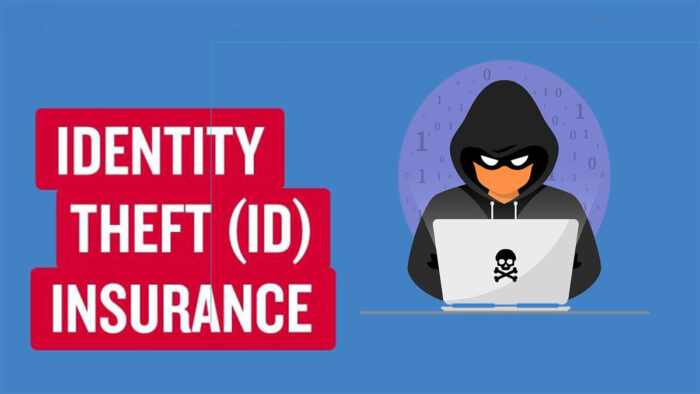If you suspect someone might be trying to impersonate you or steal your personal information, don’t wait to act. Purchasing identity theft insurance can help restore your identity in the event of theft. The primary motive behind identity theft is usually financial gain, so protecting yourself is crucial.

Numerous insurance companies offer identity theft insurance as an add-on service to renters, homeowners, and other policies.
Identity theft can happen to anyone, and the consequences can be severe. Many victims lose substantial amounts of money and spend considerable time reversing the damage. This is why purchasing identity theft insurance is essential.
It’s important to know that identity theft insurance not only safeguards your identity but also helps prevent stolen identities and resolves identity theft losses. Opting for a family plan will protect your entire household, providing peace of mind for everyone.
What is Identity Theft Insurance?
Identity theft insurance is a type of insurance that helps you cover the costs associated with restoring your identity after such an event, although it typically doesn’t reimburse any money lost during the theft.
Numerous major insurance providers offer identity theft insurance as an optional addition to policies like homeowners or renters insurance. The cost usually ranges from $20 to $60 annually, but more extensive coverage may come with a higher price tag.
How Much Does Identity Theft Insurance Cost?
The cost of identity theft Insurance varies among identity theft insurance providers. Also, the cost depends on a few factors, like how comprehensive the coverage is and where you live.
Identity theft insurance can actually be added to an existing insurance policy, or you can purchase it as a standalone policy. Whichever way you want it, just make sure you are purchasing identity theft insurance.
Do I Need Identity Theft Insurance?
Of course, you need identity theft insurance. You might not need it now, but someday you will. Identity theft is on the rise. So, to be on the safe side, you should consider it if it is at a good price.
What Does Identity Theft Insurance Cover?
Identity theft insurance provides financial assistance to help you recover from identity theft-related expenses, including legal fees and lost income. For example, you can receive reimbursement (up to your policy limit) for costs associated with restoring your identity.
Keep in mind that identity theft insurance doesn’t actively protect your identity or warn you of issues with your credit report unless it includes a monitoring service.
Expenses it covers may include:
- Credit application fees
- Notary and postage fees, which could also involve reimbursement for expedited shipping costs
- Legal fees for hiring an attorney to defend against civil suits and criminal charges, remove civil judgments, and provide counsel during governmental audits or hearings
- Fees imposed by financial institutions related to identity fraud
- Lost wages: if you need time off work to address identity theft matters, like meeting with your attorney,
- Child care costs incurred while you’re taking the necessary steps to restore your identity
Typically, identity theft insurance covers only expenses that occur after the theft, such as legal fees, lost wages, and application fees. It generally won’t reimburse direct financial losses resulting from the theft, like fraudulent credit card transactions.
What Does Identity Theft Insurance Not Cover?
There are a few things identity theft does not cover, and they are listed below.
- It does not cover stolen money.
- It does not cover direct financial losses from fraudulent purchases.
- Unauthorized use of credit accounts
These are the things not covered by your identity theft insurance. Identity theft insurance only reimburses you for the cost of the recovery process.
How to Get Identity Theft Insurance
To obtain identity theft insurance, consider the following sources:
- Insurance companies: Approach your current insurance provider or shop around for quotes from different insurers.
- Identity theft protection services: Some services offer insurance as part of their protection package, so check the available options.
- Credit card companies: Certain credit card providers include identity theft insurance as a cardholder benefit or offer it as an add-on.
By exploring these avenues, you can find an identity theft insurance policy tailored to your needs.
How to Prevent Identity Theft
Safeguarding your identity is crucial to avoiding financial and emotional distress caused by identity theft. By being proactive, you can make it more challenging for thieves to steal your personal information. Here are ten recommendations from the Federal Trade Commission (FTC) to help prevent identity theft:
- Secure your Social Security number (SSN): Only provide your SSN when absolutely necessary, and avoid carrying your Social Security card in your wallet.
- Be cautious with personal information: Do not share sensitive details like your birthdate or bank account number, especially with unsolicited callers, texters, or emailers.
- Review financial statements: Regularly check your bank account and credit card statements for unauthorized transactions.
- Store personal information securely: Keep sensitive documents in a safe or safety deposit box, and shred receipts, account statements, expired credit cards, and credit offers to prevent dumpster divers from accessing your information.
- Create strong passwords: Use complex passwords, consider using a password manager, and choose security questions only you know the answers to. If a company experiences a data breach, change your password immediately and update any accounts with similar passwords.
- Install security software: Equip your home computer with virus detection software and firewalls.
- Monitor credit reports: Review your credit reports annually for any suspicious or unrecognized accounts. You can obtain a free credit report from AnnualCreditReport.com.
- Consider a credit freeze: A credit freeze, also known as a security freeze, prevents unauthorized access to your credit reports, making it difficult for thieves to open accounts in your name.
- Protect your phone and data: Secure your phone by locking it, regularly updating software, backing up data, and using a program to locate or erase a lost device.
Following these tips will help prevent and safeguard you from identity theft.
Frequently asked questions
Do I need identity theft insurance if I already have homeowners or renters insurance?
While homeowners or renters insurance may offer some identity theft coverage, it might not be sufficient for your needs. Identity theft insurance provides more comprehensive protection, often including services like credit monitoring and dedicated support for identity restoration.
How can I determine if identity theft insurance is worth the cost?
Consider the potential risks, the value of your personal assets, and the peace of mind that comes with having coverage.
If you have a high risk of exposure or would struggle to recover from identity theft losses, the cost of insurance may be justified. It’s also wise to compare the expense to the potential costs of restoring your identity without coverage.
What should I look for when choosing an identity theft insurance provider?
When selecting a provider, consider factors such as the company’s reputation, the extent of coverage, additional services offered (e.g., credit monitoring), and customer reviews. It’s also essential to compare prices and ensure the coverage limits align with your needs.
Can identity theft insurance help prevent identity theft from happening?
While identity theft insurance primarily assists with recovery after a theft occurs, some policies offer prevention-focused features like credit monitoring and alerts.
However, it’s crucial to combine insurance coverage with good personal habits, such as securing personal information and being vigilant about potential threats.



